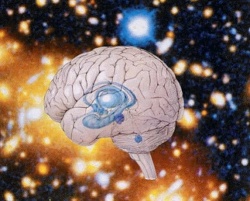Difference between revisions of "The Absolute and the Relative Reality"
| Line 1: | Line 1: | ||
[[File:144gination.jpg|thumb|250px|]] | [[File:144gination.jpg|thumb|250px|]] | ||
| − | |||
| − | It is generally considered that between these [[two extremes]] there is no {{Wiki|continuum}}, unlike the other dimension/parameters we have considered. The lower, [[relative reality]], is a juxtoposition on the higher, the [[Absolute Reality]]. That's why the various [[Indian]] [[philosophies]] ({{Wiki|Vedanta}}, [[Mahayana]], etc) speak of the "[[Two Truths]]", the [[Relative]] and the [[Absolute Truth]]. Hence [[Enlightenment]] ({{Wiki|realisation}} of the [[Absolute]]) is not something to be [[attained]], because one always was and is the {{Wiki|Absolute}}. [[Enlightenment]] is simply the {{Wiki|realisation}} that you are the {{Wiki|Absolute}} right now, and that there is no {{Wiki|birth}} or {{Wiki|death}}, {{Wiki|future}} or {{Wiki|past}}, [[self]] or other, but only the [[eternal]] {{Wiki|present}}, the one {{Wiki|universal}} "I" (this is putting it very simply, but [[space]] does not allow an analysis of the subtlties of the [[doctrine]], or the differences between [[Mahayana]] [[Buddhist]] and {{Wiki|Advaita Vedanta}} conceptions of [[Enlightenment]]). | + | |
| + | |||
| + | |||
| + | |||
| + | |||
| + | |||
| + | |||
| + | |||
| + | |||
| + | The [[Unmanifest]] [[Absolute Reality]] in Itself - [[Shunyata]], [[Paramatman]], {{Wiki|Tao}}, [[Buddha-nature]], etc - is the Supreme Ground of all {{Wiki|Reality}}. | ||
| + | |||
| + | Its {{Wiki|attainment}} is [[experienced]] as [[Nirvana]] or {{Wiki|Liberation}} or or {{Wiki|Self-Realization}}. | ||
| + | |||
| + | The opposite of this [[state]] is the [[world]] of [[phenomena]], [[Maya]], the [[relative truth]], {{Wiki|Illusion}}, [[Samsara]], "the [[wheel]] of [[rebirth]]", {{Wiki|subject}} to [[Ignorance]] ([[avidya]]) of one's [[True Nature]], {{Wiki|craving}}, [[unhappiness]], and so on. | ||
| + | |||
| + | |||
| + | It is generally considered that between these [[two extremes]] there is no {{Wiki|continuum}}, unlike the other dimension/parameters we have considered. | ||
| + | |||
| + | The lower, [[relative reality]], is a juxtoposition on the higher, the [[Absolute Reality]]. | ||
| + | |||
| + | That's why the various [[Indian]] [[philosophies]] ({{Wiki|Vedanta}}, [[Mahayana]], etc) speak of the "[[Two Truths]]", the [[Relative]] and the [[Absolute Truth]]. | ||
| + | |||
| + | Hence [[Enlightenment]] ({{Wiki|realisation}} of the [[Absolute]]) is not something to be [[attained]], because one always was and is the {{Wiki|Absolute}}. | ||
| + | |||
| + | [[Enlightenment]] is simply the {{Wiki|realisation}} that you are the {{Wiki|Absolute}} right now, and that there is no {{Wiki|birth}} or {{Wiki|death}}, {{Wiki|future}} or {{Wiki|past}}, [[self]] or other, but only the [[eternal]] {{Wiki|present}}, | ||
| + | |||
| + | the one {{Wiki|universal}} "I" (this is putting it very simply, but [[space]] does not allow an analysis of the subtlties of the [[doctrine]], or the differences between [[Mahayana]] [[Buddhist]] and {{Wiki|Advaita Vedanta}} conceptions of [[Enlightenment]]). | ||
| + | |||
| + | |||
| + | |||
| + | |||
| + | |||
| + | |||
| + | |||
{{R}} | {{R}} | ||
[http://www.kheper.net/integral/Absolute_and_Relative.htm www.kheper.net] | [http://www.kheper.net/integral/Absolute_and_Relative.htm www.kheper.net] | ||
[[Category:Reality in Buddhism]] | [[Category:Reality in Buddhism]] | ||
[[Category:Absolute]] | [[Category:Absolute]] | ||
Latest revision as of 09:11, 19 May 2019
The Unmanifest Absolute Reality in Itself - Shunyata, Paramatman, Tao, Buddha-nature, etc - is the Supreme Ground of all Reality.
Its attainment is experienced as Nirvana or Liberation or or Self-Realization.
The opposite of this state is the world of phenomena, Maya, the relative truth, Illusion, Samsara, "the wheel of rebirth", subject to Ignorance (avidya) of one's True Nature, craving, unhappiness, and so on.
It is generally considered that between these two extremes there is no continuum, unlike the other dimension/parameters we have considered.
The lower, relative reality, is a juxtoposition on the higher, the Absolute Reality.
That's why the various Indian philosophies (Vedanta, Mahayana, etc) speak of the "Two Truths", the Relative and the Absolute Truth.
Hence Enlightenment (realisation of the Absolute) is not something to be attained, because one always was and is the Absolute.
Enlightenment is simply the realisation that you are the Absolute right now, and that there is no birth or death, future or past, self or other, but only the eternal present,
the one universal "I" (this is putting it very simply, but space does not allow an analysis of the subtlties of the doctrine, or the differences between Mahayana Buddhist and Advaita Vedanta conceptions of Enlightenment).
